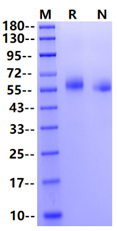Lys24-Trp454, with C-terminal 8*His KHPDDFRVVGPNLPILAKVGEDALLTCQLLPKRTTAHMEVRWYRSDPDMPVIMYRDGAEVTGLPMEGYGGRAEWMEDSTEEGSVALKIRQVQPSDDGQYWCRFQEGDYWRETSVLLQVAALGSSPNIHVEGLGEGEVQLVCTSRGWFPEPEVHWEGIWGEKLMSFSENHVPGEDGLFYVEDTLMVRNDSVETISCFIYSHGLRETQEATIALSERLQTELASVSVIGHSQPSPVQVGENIELTCHLSPQTDAQNLEVRWLRSRYYPAVHVYANGTHVAGEQMVEYKGRTSLVTDAIHEGKLTLQIHNARTSDEGQYRCLFGKDGVYQEARVDVQVMAVGSTPRITREVLKDGGMQLRCTSDGWFPRPHVQWRDRDGKTMPSFSEAFQQGSQELFQVETLLLVTNGSMVNVTCSISLPLGQEKTARFPLSGWGGGSHHHHHHHH
1. Arnett, H.A. et al. (2007) J. Immunol. 178:1523. 2. Arnett, H.A. et al. (2009) Cytokine 46:370. 3. Smith, I.A. et al. (2010) J. Immunol. 184:3514. 4. Nguyen, T. et al. (2006) J. Immunol. 176:7354.
Butyrophilin-like 2 (BTNL2) is a member of the BTN/MOG Ig-superfamily and functions as a negative regulator of immune cell activation. BTNL2 is expressed in epithelial cells of the small intestine, colonic dendritic cells, and in cells of the lymph node. BTNL2 expression is upregulated in T cells following activation, a characteristic BTNL2 shares with the homologous B7 family of co-stimulatory molecules. BTNL2 negatively regulates T cells by inhibiting proliferation and inflammatory cytokine secretion. It also increases the expression of FoxP3 in T cells to promote regulatory T cell development. Single nucleotide polymorphisms in BTNL2 are associated with a risk for sporadic prostate cancer, rheumatoid arthritis, sarcoidosis, ulcerative colitis, and other inflammatory diseases.

1μg (R: reducing conditions, N: non-reducing conditions).